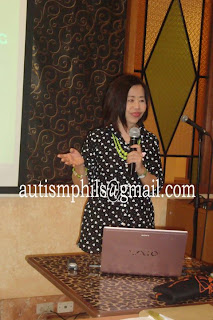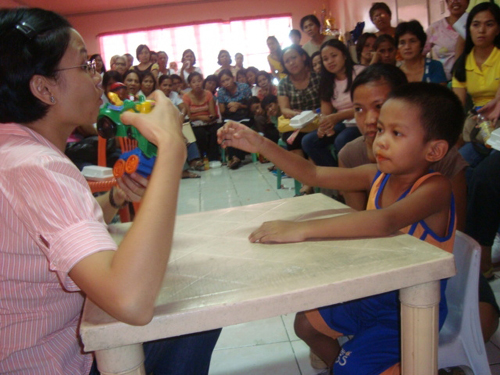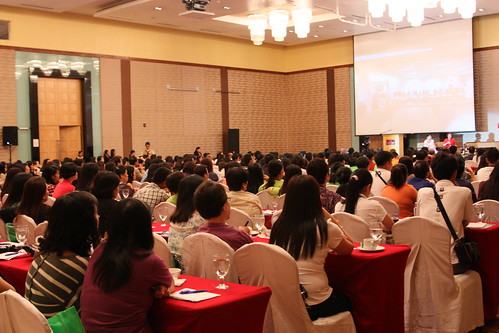By Cricel Elises, ASP Administrative Staff
Much sought after speaker-trainer, ASP Chair Emeritus, Dang Koe, trained Chapters Leaders, professional members and staff of ASP coming from Metro Manila and Luzon on Early Detection of Autism last August 29-30 at Kabayan Hotel, Pasay City. The said activity aimed to equip participants with knowledge on autism, and skills on how to become effective speakers. The training was part of the preparation for re launching of the Early Detection and Early Intervention Project of ASP which was started in 2004 in partnership with Autism Society Norway. The project trained more than five thousand (5,000) Barangay Health Workers, Day Care Teachers, Social Workers and parents of children with autism on Early Detection and Early Intervention since it started.
 |
| ASP Chair Emeritus Dang Koe |
Ms. Mary Janette Peña, ASP Bacoor, Cavite Chapter President gave the invocation followed by a welcome remarks by Ms. Mary Grace Adviento, ASP National-President.
 |
| ASP National President Mary Grace Adviento |
Day One
The formal session started with a lecture on “Effective Public Speaking” by Ms. Dang Koe, Chair Emeritus of ASP. Her lecture included the topics on Preparing and Delivering Advocacy Talks, Using Power Point Presentation, Do’s and Don’ts on How to be an Effective Public Speaker.
In the afternoon, Ms. Koe gave another lecture on “Facilitation Skills”. The lectured primarily included the four basic facilitation skills: 1. Attending 2. Observing, 3. Listening, and 4. Questioning. Ms. Koe also shared to the group her personal observations and experiences during her trips to the provinces, schools and different public speaking engagements.
The afternoon ended with a lecture by ASP Executive Director Ranilo Sorongon on Republic Act 9442 or the Discounts and Privileges of Persons with Disabilities. He also gave some updates on disability laws and the rights of PWD. He likewise reminded the chapter leaders to coordinate with their local PDAO (Persons with Disability Affairs Office) to ensure the implementation of programs and services for PWD.
Day Two
ASP EDEIP Trainers, Ms. Rizalinda Cansanay (ASP Laguna Chapter President) and Marie Rosemarie Sorongon (Special Educator) gave a lecture on Early Detection of Autism (EDIEP Part 1). They also shared their experiences and tips to the participants as resource speakers.
After the lecture, the participants were divided into two groups. Group 1 was headed by Teacher My as facilitator and Ms. Grace Adviento as co-facilitator. Ms. Cansanay was in charge of group 2 with Ms. Peng So as co-facilitator. Each individual was assigned to give a 10-minute presentation on different topics like the definition and background of autism, behavioral manifestations, red-flags, developmental milestones and autism alert with a five (5) minute feedback coming from the facilitator and also from the members of each group after each presentation. Participants were also taught how to customize their Power Point presentation using the Filipino or local language to suit their target audience- the barangay health workers and day care teachers.
Ms. Peng So (ASP-National Vice President) closed the 2 day training by sharing her personal experiences during her lectures with SM Supermalls in educating the mall front liners in caring for special customers. She also posed a challenge to everyone to be ready whenever they will be invited as resource speaker.
The two-day EDEIP Trainers’ Training was truly an unforgettable experience - full of laughter and at the same time, jam-packed with new knowledge. This training opened new doors for new aspiring speakers who are now equipped to take on the challenges of educating more people about autism.
 |
| ASP Trustees and Chapter Leaders |
The participants are the following:
ASP National Office: Dang Koe (Chair Emeritus), Grace Adviento (President), Peng So (Vice President), Evelyn Go (Treasurer), Evert Malapad (Auditor and Metro-South Chapter, President), Ranil Sorongon (Executive Director), Cecille Sicam (ASP Co-Founder), Leilani “Bing” David (Moderator-Documentor), ASP Angels: Melanie Casalme, Catherine Genovia, Abegail Mendoza, and Cricel Elises.
ASP Chapter Leaders: Ms. Mary Janette Peña, President, ASP Bacoor, Ms. Raceli De Castro, Vice President ASP Batangas City, Ms. Jennifer Gundran, President, ASP Baguio, Ms Tess Wachakan, ASP Baguio, Ms. Josephine Palomares, President, ASP Diliman-Quezon City, Ms. Rizalinda Cansanay, President, ASP Laguna, Ms. Catherine Lopez, Vice President, ASP Laguna, Ms. December Banzuelo, ASP Laguna, Ms. Adeluisa Martinez, Past President, ASP Lucena, Ms. Mary Antonette Pacunana, ASP Marikina Valley, Mr. Evert Malapad, President, ASP Metro South, Dr. Anawi Tolentino, President, ASP Malolos, Ms. Jacqueline Garcia, President, ASP Molino, Ms. Veronica Bambilla, ASP Molino, Ms. Norimyl Perocho, President, ASP Muñoz-Quezon City, Ms. Nina Sibulo, President, ASP Naga, Ms. Emilia Sanchez, ASP Olongapo, Ms. Joyla N. Ofrecia, President, ASP San Fernando, Pampanga, Ms. Elizabeth Udquin, President, ASP UP CAMP Manila, Ms. Jennette Rodriguez, Secretary, ASP UP CAMP Manila, Ms. Nida Valeriano, President, ASP Valenzuela.
ASP Professional Members: Ms. Christina Borneo, Ms. Kismette Cepe, Ms. Kate Reyes.
ASP and all the 35 participants would like to extend our sincerest gratitude to the management and staff of Kabayan Hotel, Pasay, and to ASP’s Angel, Bahay ni Angelo King Foundation for sponsoring the event.






 Posted in:
Posted in: 









